This is a broad timeline of the course of major events of the Syrian civil war. It only includes major territorial changes and attacks and does not include every event.

On 22 September 2014, the United States officially intervened in the Syrian civil war with the stated aim of fighting the Islamic State as part of Operation Inherent Resolve in the international war against the Islamic State. The U.S. also supports the Syrian rebels and the Kurdish-led Syrian Democratic Forces opposed to both the Islamic State and Syrian president Bashar al-Assad.
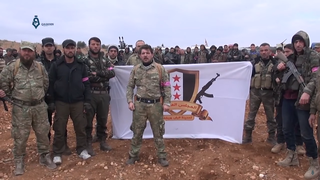
Turkey's involvement in the Syrian Civil War began diplomatically and later escalated militarily. Initially, Turkey condemned the Syrian government at the outbreak of civil unrest in Syria during the spring of 2011; the Turkish government's involvement gradually evolved into military assistance for the Free Syrian Army in July 2011, border clashes in 2012, and direct military interventions in 2016–17, in 2018, in 2019, 2020, and in 2022. The military operations have resulted in the Turkish occupation of northern Syria since August 2016.

AANES–Syria relations concern the military and political relations between the Ba'athist Syrian Arab Republic and the Autonomous Administration of North and East Syria (NES), a de facto autonomous multi-ethnic region in northern and eastern Syria. The Syrian government does not officially recognise the autonomy of the AANES, and advocates a centralist approach to the governance of Syria. The NES seeks the federalisation of Syria. For most of the Syrian civil war, there has been a non-aggression pact between the military of Syria and the Syrian Democratic Forces, with occasional confrontations and some cooperation against Islamist groups, in particular against the Turkish Armed Forces and the Turkish-backed Syrian National Army. While the two sides co-operated militarily under Russian supervision since 2019, with Syrian and Russian troops stationed along the Turkish border to prevent further advances, political negotiations have ended in failure. The Syrian government has no authority or institutions in North and East Syria outside of its two security boxes in Qamishli/Qamislo and Al-Hasakah/Heseke. The Autonomous Administration does not allow the Syrian Government to hold elections in areas under its control.

The Syrian Democratic Forces (SDF) is a coalition formed by ethnic militias and rebel groups, and serves as the official military wing of the Autonomous Administration of North and East Syria (AANES). The SDF is allied to and supplied by the United States–led CJTF–OIR international alliance. Founded in 10 October 2015, the SDF claims that its mission is fighting to create a secular, democratic and federalised Syria. The SDF is opposed by Turkey, who claims the group has direct links to the PKK, which it recognizes as a terrorist group.
Arima, also spelled Orayma or Arimah, is a town and seat of a subdistrict (nahiya) in Al-Bab District, located 20 kilometers (12 mi) northeast of the city of al-Bab and 65 kilometers (40 mi) northeast of Aleppo in northern Syria. In the 2004 census, it had a population of 2,839. The town of Qabasin is also to the south-west, and closer than Al-Bab. Manbij city is to the north-east. In course of the Syrian Civil War, the town repeatedly changed hands. As of 2020, it was under dual control of the Syrian government and the Autonomous Administration of North and East Syria (AANES).
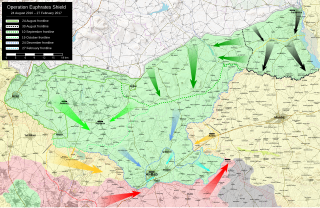
Operation Euphrates Shield was a cross-border military operation conducted by the Turkish Armed Forces in the Syrian Civil War which led to the Turkish occupation of northern Syria. Operations were carried out in the region between the Euphrates river to the east and the rebel-held area around Azaz to the west. The Turkish military and Turkey-aligned Syrian rebel groups, some of which used the Free Syrian Army label, fought against the forces of the Islamic State (IS) as well as against the Syrian Democratic Forces (SDF) from 24 August 2016. On 29 March 2017, the Turkish military officially announced that Operation Euphrates Shield was "successfully completed".

The Syrian Democratic Forces (SDF) has many military councils for local security and defense, each being accountable to the civil council of the area they operate in.
The following is a timeline of the Syrian Civil War from January to April 2017. Information about aggregated casualty counts is found at Casualties of the Syrian Civil War.
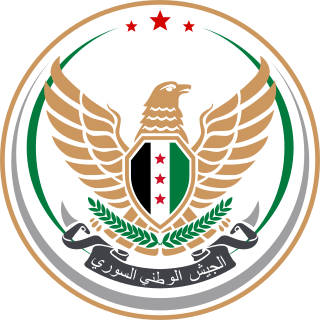
The Syrian National Army, previously the Free Syrian Army (FSA) and also known as the Turkish-backed Free Syrian Army (TFSA), is a coalition of armed Syrian opposition groups in the Syrian Civil War. Comprising various rebel factions that emerged at the onset of the war in July 2011, it was officially established in 2017 under the auspices of Turkey, which provides funding, training, and military support.
The following is a timeline of the Syrian Civil War from September to December 2017. Information about aggregated casualty counts is found at Casualties of the Syrian Civil War.
The following is a timeline of the Syrian Civil War from January to April 2018. Information about aggregated casualty counts is found at Casualties of the Syrian Civil War.
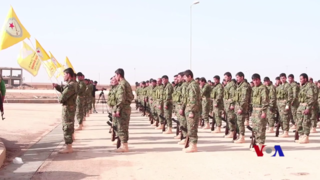
The Syrian Border Security Force (BSF) is a reported U.S.-trained border security force which is to deploy along Syria's borders with Turkey, Iraq and the Euphrates, with the strategic aim of containing remnants of the Islamic State of Iraq and the Levant (ISIL). The US state department recently denied the implementation of any border security force by the US government referring to the new development simply as security training.

The 2018 Syrian-Turkish border clashes began on 31 October 2018 when the Turkish Armed Forces began to shell People's Protection Units (YPG) positions near the cities of Kobani and Tell Abyad as well as surrounding villages. Turkey views the YPG as an extension of the outlawed Kurdistan Workers' Party (PKK), which has been waging an insurgency in Turkey for over 40 years.
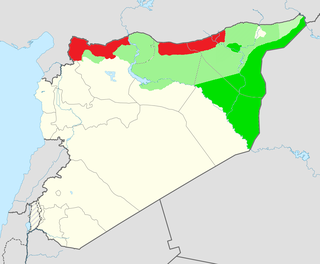
The Eastern Syria insurgency is an armed insurgency being waged by remnants of the Islamic State of Iraq and the Levant (ISIL) and both pro and anti-Syrian government Arab nationalist insurgents, against the Autonomous Administration of North and East Syria (AANES), its military, and their allies in the US-led Combined Joint Task Force – Operation Inherent Resolve (CJTF–OIR) coalition.
The following is a timeline of the Syrian Civil War from January to April 2019. Information about aggregated casualty counts is found at Casualties of the Syrian Civil War.

The 2019 Turkish offensive into north-eastern Syria, code-named Operation Peace Spring by Turkey, was a cross-border military operation conducted by the Turkish Armed Forces (TSK) and the Syrian National Army (SNA) against the Syrian Democratic Forces (SDF) and later Syrian Arab Army (SAA) in northern Syria.
2010s in Syria political history refers to events during the 2010s in political history of Syria.
The following is a timeline of the Syrian Civil War from September–December 2019. Information about aggregated casualty counts is found at Casualties of the Syrian Civil War.
The following is a timeline of the Syrian civil war for 2022. Information about aggregated casualty counts is found in Casualties of the Syrian civil war.










